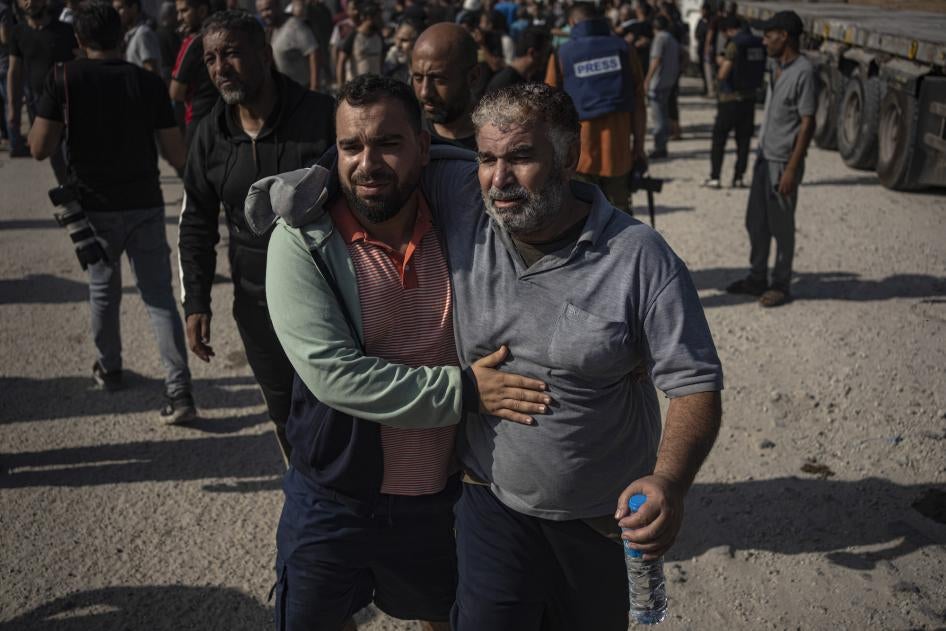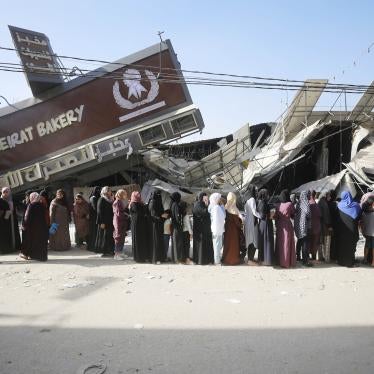(Jerusalem) – Israeli authorities held thousands of workers from Gaza in incommunicado detention for several weeks following the October 7 attacks, subjecting at least some of them to inhumane and degrading conditions, Human Rights Watch said. Thousands more remain stranded in the occupied West Bank without valid legal status and vulnerable to arrest.
Those detained after October 7 were held by Israeli authorities in Israel and the West Bank, some of whom were reportedly interrogated on alleged links to, or knowledge of, the attacks. On November 3, over 3,000 Palestinian workers were released from detention and transferred to Gaza. Israeli authorities have yet to state the total numbers of workers from Gaza in Israel on October 7, or the number of workers who were detained or remain detained. Israeli authorities have not disclosed if any workers from Gaza were charged with any crime.
“Israeli authorities detained thousands of workers for weeks without charge in incommunicado detention, subjecting at least some to humiliating ill-treatment,” said Michelle Randhawa, senior refugee and migrant rights officer at Human Rights Watch. “The search for perpetrators and abettors of the October 7 attacks does not justify abusing workers who had been granted permits to work in Israel.”
The October 7 Hamas-led attacks killed an estimated 1,200 people, mostly civilians, according to Israeli authorities. More than 21,600 Palestinians have been killed, including more than 8,500 children, during the hostilities, according to Gaza authorities.
An estimated 18,500 workers from Gaza had permits to work in Israel on October 7, though it is unclear how many were in Israel that day. To get permits, applicants from Gaza underwent stringent security evaluations.
On December 19 and 21, Human Rights Watch wrote to the Israeli military and Israel Prison Service with its findings asking for comment, but received no response, as of writing.
Human Rights Watch spoke to four workers from Gaza detained by Israeli authorities after October 7. Three workers were part of a small group released to the West Bank before November 3, and one was released on November 3 to Gaza.
One man attempted to go to the West Bank after he realized his work permit was cancelled and deleted from Al Munasiq, the phone app where work permits are stored. He said he was stopped at a checkpoint on the way to the West Bank, blindfolded, hands tightly bound with zip ties, and taken first to Ofer prison, and then to an unknown second location. There, he said, “They [forced me to take] off all my clothes…and they took pictures of me.…They beat me intensely, I was naked during this, it was humiliating. The worst part was when the dogs were attacking [me]. I was blindfolded and cuffed with metal shackles, I didn’t know if the dogs were controlled by someone or just left to attack me, I was terrified.”
He was interrogated and asked to identify his home on an aerial map of Gaza and was also asked about specific people. He was then released on November 3 at the Kerem Shalom crossing into Gaza.
Another man said Israeli police in Rahat, a city in southern Israel, arrested him and other workers from Gaza after the October 7 attacks and took them to an army base in Ofakim, Israel.
[The Israeli forces] “made us undress,” he said. “[We were] completely naked. They handed us Pampers to wear and thin white overalls…. We stayed blindfolded and cuffed [with zip ties on our hands and feet] for 10 days... We kept asking why we are detained. We never got an answer, only verbal assaults and death threats.”
He said he was beaten for hours, then dragged on gravel face down and attached to a wall or fence by his cuffed hands, and then beaten again: “Every time I fell on the ground I was forced to stand up, and again more beatings and I fell on the ground. With every beating and fall the plastic zip ties on my hands became tighter and more painful.”
He was then transferred to Ofer prison where he spent another four or five days until he was released into the West Bank.
Another man who worked in Rahat said he and other workers were arrested and taken to the Rahat police station on or around October 9. While blindfolded with their hands zip-tied behind their backs, “Israeli forces constantly cursed at us…and threatened to kill us.... We were held for 12 hours. We were not allowed water or [to use] the bathroom.”
Israeli forces also transferred him to Ofer prison, where he said he was interrogated about Hamas in Gaza. On October 22, Israeli authorities released him to Palestinian Red Crescent paramedics, who took him by ambulance to the Ramallah Public Hospital, where staff treated his zip tie wounds. Human Rights Watch saw the scars on his wrists.
The Israeli military spokesperson confirmed to Haaretz two Gaza workers, one with cancer, one with diabetes, died in Israeli custody, saying, “The two died due to […]complex medical condition[s] contracted before they arrived at the facilities. An investigation is being conducted into the circumstances of their death.” Both men were arrested after October 7. One of the men Human Rights Watch interviewed said there was a cancer patient with him in Ofer who died after a few days in pain.
The Israeli human rights groups Gisha and HaMoked told Human Rights Watch that families in Gaza contacted them after October 7 when they stopped hearing from relatives with work permits in Israel. Both organizations requested permission to visit the detainees, speak to them by phone, and receive information on their judicial status, yet to no avail.
“We had no contact with the Gaza workers while they were detained,” said Nadya Daqqah, a lawyer from HaMoked. “It can’t get any more incommunicado than this.”
On October 23, six human rights organizations in Israel filed an urgent petition with Israel’s High Court, which stated Israeli authorities had refused to provide any information about where workers were being detained, under what law, and for how long.
On November 2, Gisha and HaMoked submitted a second urgent petition to Israel’s High Court stating that “the detainees were being held…without access to legal representation” and allegedly subjected to “physical violence and psychological abuse, as well as…inhumane conditions.”
On November 2, the Israeli cabinet voted to return “Gaza workers who were in Israel on the day the war broke out” to Gaza. The next day, Israeli authorities released 3,026 Palestinian workers to Gaza via the Kerem Shalom crossing. On November 13, the Court rejected the petition, given the release of workers on November 3.
The released Palestinian workers gave media interviews, describing abuses and degrading conditions in detention, including being subjected to electric shocks, urinated on, attacked by dogs, as well as held for several days without food or water. Human Rights Watch was not able to verify these accounts. Gisha interviewed two brothers who had similar accounts of being blindfolded, beaten, and held without any communication with either their families or lawyers.
On November 9, the Israeli government published an emergency regulation on the “detention and deportation of unlawful residents of [Gaza].” The regulation states that Gaza workers no longer have a legal basis for being in Israel – since Israeli authorities canceled their work permits – and will be held in custody until removal. While the regulation sets time limits on detention, it also allows for extensions based on security needs.
The situation of the thousands of workers from Gaza who fled or were released to the West Bank remains unclear. Many are living in temporary shelters provided by the Palestinian Authority and nongovernmental organizations. There are reports from late November that Israeli Defense Forces have arrested workers from Gaza who had been sheltering in private homes.
On November 10, Israel, in coordination with the Palestinian Authority, transferred another group of 982 workers from Gaza who had been sheltering in the West Bank to Gaza via the Kerem Shalom crossing.
On November 28, Israeli authorities released 300 Palestinian workers to Gaza via the Kerem Shalom crossing. According to Osnat Cohen-Lifshitz, the head of Gisha’s legal department, these workers were released from the Anatot military base.
“Israeli authorities should disclose how many workers from Gaza were in Israel on October 7, how many were detained, whether any remain in detention and the basis for their detention,” Randhawa said. “They should investigate reports of abuse in detention and ensure the humane treatment of all detainees.”








